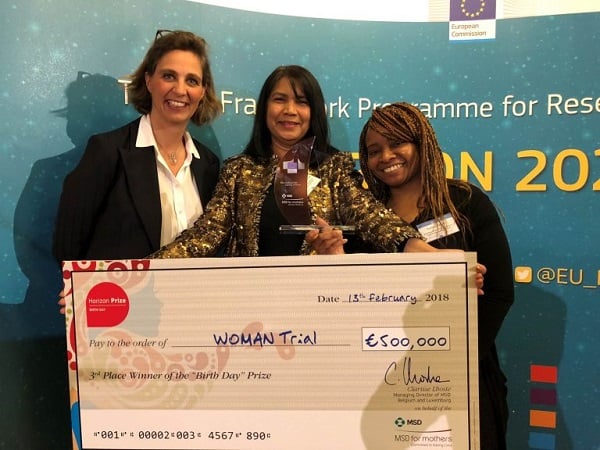WOMAN Trial awarded third place in Horizon Birth Day Prize
15 February 2018 London School of Hygiene & Tropical Medicine London School of Hygiene & Tropical Medicine https://lshtm.ac.uk/themes/custom/lshtm/images/lshtm-logo-black.pngThe Horizon Birth Day Prize is an initiative of the European Commission which has committed €1 million from Horizon 2020, the EU research and innovation programme. The Bill & Melinda Gates Foundation pledged another €1 million and the MSD for Mothers programme of Merck Sharp & Dohme Corporation donated a further €500,000. The WOMAN Trial has been awarded the third winner prize in the Horizon Birth Day Prize Contest by the MSD for Mothers programme, in recognition for its work on severe bleeding after childbirth (postpartum haemorrhage).
Postpartum haemorrhage is the leading single cause of maternal mortality worldwide. The WOMAN Trial collaboration conducted a study of 20,000 women in 21 countries, and found that rapid treatment with a simple and inexpensive drug called tranexamic acid reduced death due to bleeding by a third.
WOMAN Trial Project Director Haleema Shakur-Still received the award on behalf of the team at a ceremony in Brussels, Belgium on 13 February.
She said: “We want to stop women dying unnecessarily after giving birth and will continue to engage with clinical bodies and policymakers to make sure tranexamic acid is used as a frontline treatment. We are delighted and grateful to accept this prize which will enable us to boost training opportunities and progress next steps in our research to reduce maternal mortality.”
A research team from the Institut de Recherche pour le Développement in France won the first €1 million Horizon Birth Day Prize for QUARITE (Quality of care, risk management, and technology in obstetrics to reduce hospital-based maternal mortality in Senegal and Mali) that has cut the number of deaths of new mothers in hospitals in Mali and Senegal by as much as a third. The second place award (€1 million) went to Dr Owens Wiwa and his team of the Clinton Health Access Initiative for the application CHAI MNH Nigeria.
The prizes were awarded by Carlos Moedas, Commissioner for Research, Science and Innovation, Mark Suzman, Chief Strategy Officer of the Bill & Melinda Gates Foundation, and Clarisse Lhoste, Managing Director of MSD Belgium and Luxembourg and MSD for Mothers Ambassador.
Commissioner Moedas said: "It's tragic to see that so many mothers or their newborn babies die. Through this contest, we identified several ways of preventing these deaths. The collaboration with the Bill & Melinda Gates Foundation and MSD for Mothers is an excellent example of how funders can pool strength and resources to make a difference and to save lives."
According to UNICEF, 5.9 million children per year die before their 5th birthday, of which 2.65 million are newborn babies. The World Health Organization (WHO) states that 300,000 women died in 2015 from preventable causes related to pregnancy and childbirth. According to WHO figures, for every woman dying of pregnancy-related complications every year, between 20 and 30 others experience permanent side-effects that undermine their ability to function normally. Although, maternal mortality rate has decreased by almost half within the European region between 2000 and 2015, (from 33 to 16 deaths per 100.000 live births), it is almost 60% higher in low-income countries outside Europe.
Through EU programmes for research and innovation, namely Horizon 2020 (2014-20), and its predecessor, FP7 (2007-13), the Commission has invested more than €740 million into research related to maternal and newborn health.
Horizon Prizes are 'challenge' prizes (also known as ‘inducement' prizes) offering a cash reward to whoever can most effectively meet a defined challenge. Horizon Prizes do not prescribe the methodology or any technical details, giving applicants total freedom to come up with the most promising and effective solution.
If you enjoyed this article and would like to build a career in global health, we offer a range of MSc programmes covering health and data, infectious and tropical diseases, population health, and public health and policy.
Available on campus or online, including flexible study that works around your work and home life, be part of a global community at the UK's no.1 public health university.
